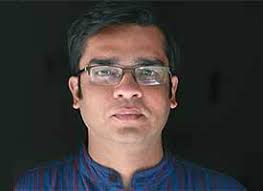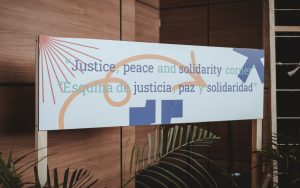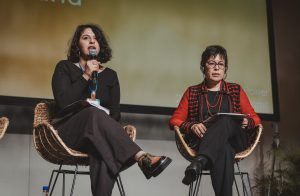‘Shift the power’: Narrow internal gaze or shaping an equal future?
17 Apr 2024
This piece originally appeared in Alliance magazine.
Seven hundred extraordinary people from philanthropies, developmental agencies, NGOs, and community groups, gathered in Bogotá, Colombia last December to deliberate on the unequal power distribution in the global developmental sector,[1] and to find paths to redress this distortion.
The call from Bogotá

Amitabh Behar, Interim Executive Director of Oxfam International & GFCF board member
International development has become the primary vehicle for the delivery of humanitarian aid and development supplementing the State functions in developing countries. The theoretical underpinning of this system can be summarized around the aspirations of bottom-up development, with people at the centre of these endeavours, working within the framework of human dignity, rights, and development for all. This framework is the quintessential embodiment of the post war liberal democratic project and stands on the frontlines of setting the normative standards including a feminist, anti-colonial, anti-structural racism, and environmentally sustainable journey.
Sadly, the verdict from Bogotá is that the international development sector pays only lip service to these normative frameworks, while it remains trapped in colonial and patriarchal frameworks privileging the entitled and powerful.
The call from Bogotá was loud – to end this concentration of power and to shift it to the South, to local groups, and directly to communities to ensure that the ordinary people are able to script their own futures.
Rearranging deck or real shift of power?
The rationale for the call to ‘shift the power’ is primarily twofold.
First, the concentration of power in a few hands is antithetical to the course global development sector has adopted. This might accrue some welfare benefits to the people living in poverty, but it does not lead to sustainable change and has the tendency to perpetuate a cycle of poverty and welfarism.
Second, this concentration of power in a few elite northern actors contradicts the values and normative framework of the development sector. Only a rhetorical adherence to the idea of distributed power matrix, while in practice concentration of power, runs the risk of hollowing out the norms which act as the north star for the sector. The ethical and moral compass would collapse leading to a dismantling of the sector.
However, it is worth asking if this critique of concentration of power within the development sector is largely transactional in nature or does it go into the root causes. Ideas of substantive justice, colonialism, patriarchy did often come into the discussions but were not the framing glue.
If one scratches the surface, it becomes evident that this inequality in the development sector is only a manifestation of deeper inequality of the world; it is a mirror image of the current neo-liberal times, where wealth and power is getting further concentrated.
The development sector reflects and apes the power distribution of the real world: ceasefire resolutions for Gaza get vetoed even after more than 8,000 children have died; where women are engines of economic growth by their underpaid and unpaid care work; where for every dollar that comes into Africa, many more leave in the form of debt repayment, illicit financial flows, profits to TNCs but the continent is still seen as a recipient of aid and not a net donor; where billionaires have doubled their wealth while the majority of the global population is living in debt and poverty; and where the top 1% are responsible for twice the carbon emissions of the bottom 50%.
It becomes critical that a movement for ‘shift the power’ is not limited to rearranging the deck by talking about the power shifting within the sector. It would address only the manifestation of deeper malaise and not the root causes. It needs to move away from demands for better charity and more benevolent paternalistic welfarism to a reframing around solidarity and redistributive justice by addressing unjust colonial history, white privilege, inequalities of existing neo-liberal political economy, and oppressive patriarchy.
The real battle: challenging the power shift to illiberal politics?
During the Summit in Bogotá, the loudest support was for a Palestinian activist. Beyond solidarity, it was also indicative of the recognition that the real threats to a just and equal world are the breakdown of the post war liberal consensus and the wave of rising authoritarianism, xenophobia, obscene economic inequality, amidst erosion of basic humanitarian principles, human rights and dignity.
The recent election results from Argentina and Netherlands, in addition to several similar current regimes getting stronger, point to this shift of politics endangering the ideals of liberal democracies. This rightward shift fundamentally challenges the vision of a good society as embodied in the Universal Declaration of Human Rights and SDGs.
The global development sector cannot deplete its energies by naval gazing. It needs to marshal all its resources to prepare for the challenges posed by the growing illiberal shift in the world, which can jeopardize the existence of the global development sector itself.
This is by no means to divert attention from the ‘shift the power’ call. In fact, it is a plea to immediately act on the call within the sector, to be able to stand up to the massive challenges from the external political sphere. Only a more locally rooted development sector with more just distribution of power can create a bulwark against the shift towards fundamentalism and authoritarianism.
It is a plea to the sector to zoom out of its narrow gaze and focus on challenging the power shift to the Right. This can be achieved only by a deeply political understanding of the role of development, redistributing power within the sector, and importantly a new imagination of crafting a new coalition of actors who are woven together around the central ideas of justice and solidarity.
The role of the global development sector in contemporary times
The global development sector needs to introspect. While there is much to celebrate, hopefully, this introspection will alert it to its diminishing role in contributing to shaping the future of people; learn about the limitations of a de-politicized techno-professional approach to development and change; and acknowledge that the current larger political trends can negate the work done by the sector and obliterate its existence.
The global development sector needs to move away from a framework of charity and service delivery to a fundamental reboot focused on challenging the structures of inequality and injustice by standing in solidarity with peoples’ power. The battles ahead are going to be messy and would require courage in defense of the framing ideals of a good society – liberty, equality, fraternity and justice.
By: Amitabh Behar, Interim Executive Director of Oxfam International & GFCF board member
[1] The global development sector is not a homogenous entity and has enormous diversity. The diversity can be attributed to different operating principles, different vision and mission, theories of change, size, thematic or social group focus, location, etc. However, a broad and loose commonness can denote an ‘imagined community’ of global development sector.




